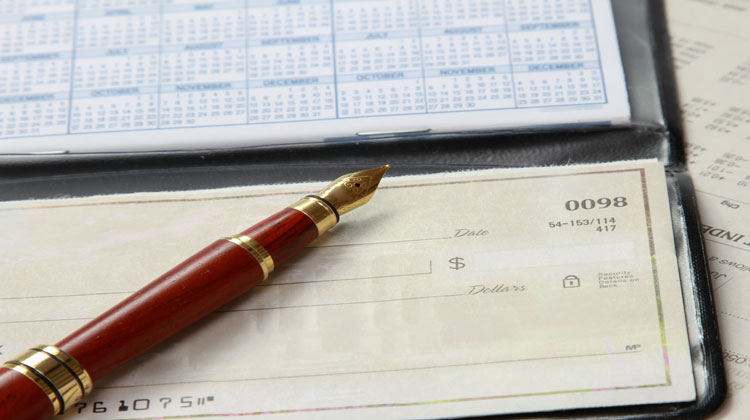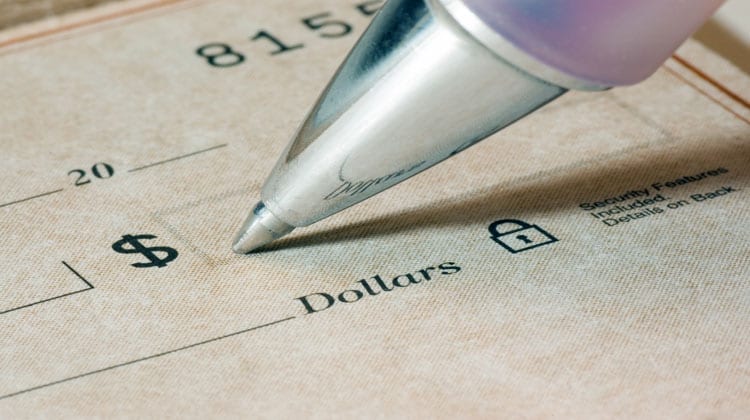THIS POST MAY CONTAIN AFFILIATE LINKS. PLEASE SEE MY DISCLOSURES. FOR MORE INFORMATION.
There is no worse feeling than realizing you’ve lost your checkbook.
If you are like most people, you usually pay for things with cash, a debit card or a credit card, and keep your checkbook in a safe place at home.
When you discover it is no longer there, you feel confusion and worry.
What do I do if I lost my checkbook, you ask yourself?
Here are the simple steps you need to take to protect your finances and give you peace of mind at the same time.
Table of Contents
What To Do If I Lost My Checkbook
Report A Lost Or Stolen Checkbook Immediately

The moment that you notice your checkbook is lost, reporting it to your bank or credit union so that they can take the necessary actions and freeze your account immediately is the first thing to do.
Hopefully, it’s only temporarily lost and not stolen.
However, making sure that you report the loss will allow the bank to stop any fraudulent transactions from taking place on your account and will give you time to try to find your checkbook.
It will also give you peace of mind knowing that the chances are slim any financial damage will be done to your account.
Remain Calm And Look Around
As mentioned, most of us leave our checkbooks at home these days, and odds are you simply misplaced it.
Maybe you always write out a check at your desk, but the other day you had to ask your spouse a question so you took it up to your bedroom and left it there.
Or maybe you spouse took it and didn’t put it back.
If you work to remain calm and think about the last time you used it, you might be able to piece back together where your lost checkbook is.
Check Your Current Transactions For Suspicious Activity
Tracking your spending is an essential activity, but most people who don’t do this only learn of its importance when it’s too late.
After you’ve lost your checkbook, look deeper into your recent bank history to see if there are any financial transactions that you don’t recognize.
Try to determine when you last used your checkbook if you aren’t certain when you lost it.
If you write checks, then going back to the last check you wrote is a good idea since you had to have your checkbook in order to write the check.
Simply look at your most recent bank statement for this information.
While you may not always be able to reverse old transactions or get your money back, you may still be able to spot transactions that are pending and report those so your money doesn’t leave your account.
Make sure that you stay on top of your spending so that you’re alerted to these types of transactions immediately.
Ask Your Bank To Stop Each Check In Your Checkbook

Some people don’t want to have to go through the process of switching accounts and dealing with an account freeze that impacts their ability to pay for day-to-day expenses.
In this case, your financial institution may actually be able to stop each check that you don’t physically have.
You should have the number of the last check you wrote as it is on your most recent statement.
And you should have the next set of checks.
Simply have your bank place a stop-payment order on the range of check numbers that are missing.
This type of service may cost you a fee, but it may be better and more convenient than having to deal with all of the other actions mentioned on this list.
By having a stop payment placed on the missing check numbers, even if those paper checks fall into the wrong hands, they won’t be able to cause you financial harm.
Close Your Current Checking Account And Open A New One
Often, the best way to protect yourself for those who have lost their check book is to close out their account and open up an entirely new one.
Why?
When someone has access to your checks, they can just continue writing checks to themselves or businesses.
Also, with your checkbook, they have your account number.
So they could use this information to buy things online without the need to write a check.
This would mean that you would have to consistently track your spending, look for transactions you didn’t authorize, and call the bank to cancel a check every time.
This isn’t a great way to go about things for you or your bank.
Instead, set aside some time to sit down with a bank representative and open up a new checking account and get a new account number.
- Read now: Learn what starter checks are
Make sure that you have a list of authorized transactions that are allowed to go through so that you can pay for things like rent, your mortgage, or your car payment.
Your banking representative will help you go through the process of opening up a new account and give you new checks so that you don’t have to worry about someone spending your money daily.
You may also get a replacement card for the ATM.
This won’t always happen as some banks can just link your bank card to your new account.
Along with visiting the bank, you should remember that you’ll no longer have this bank account to rely on for direct deposit or electronic payments.
Whether you pay your utilities from your bank account or your employer sends your paycheck to your bank account, make sure that you reach out to these individuals and institutions so that you can set up everything for your new bank account.
The last thing you want to do is default on loan payments or miss out on your income because you have a new bank account.
Reach Out To Law Enforcement
If you believe your checkbook was stolen, then you need to contact your local police department.
More importantly, if you know who did it and you have evidence, this is something you can follow up on to make sure that they don’t do something like this again.
Of course, there’s another reason that you should report your loss to the police.
If someone should spend your checks fraudulently or commit crimes using your checkbook, you might actually be held liable for the damage done.
It’s bad enough that someone is taking money out of your account, but having to deal with the financial and legal repercussions of another individual can be even worse.
When you decide to file a police report, you have it on record that your checkbook was stolen and that any transactions after the date of being stolen can’t be attributed to you.
Should the thief use checks and get in trouble with a specific vendor, this will clear your name and resolve disputes rather quickly, eliminating any unnecessary stress and legal trouble you would otherwise face.
Order A Free Copy Of Your Credit Report

Finally, you want to make sure you review your credit reports.
You want to keep an eye out for any fraudulent activity that might show up here.
Chances of this happening are slim, but it’s better to deal with issues as soon as possible as it makes them easier to fix.
Simply keep an eye out for any new credit accounts or hard inquiries that might show up.
Again, since no one has your Social Security Number, you shouldn’t see anything, but it is smart to check.
There are 3 major credit bureaus, so you should get a copy of your report from each.
The website AnnualCreditReport.com is a resource that was created by the Fair and Accurate Credit Transactions Act in 2003.
It allows you to get a copy of your credit report for free once a year.
You could also sign up for Credit Sesame.
It is a free service that not only allows you to see your credit report for free, but also your credit score.
Credit Sesame offers your credit score for free, with no credit card required. Simply provide your email and get started learning your score.
Final Thoughts
At the end of the day, there are some basic steps you should take if you lost your checkbook.
The first thing you should do is to report it to the bank and talk to a bank representative.
They will be able to walk you through your options for limiting fraud and not making your life a complete mess.
It is also a good idea to file a police report so that should any fraudulent transactions show up in your checking account, you can more easily prove fraud.
- Read now: See the amount of money you to keep in your checking account
- Read now: Why you should have a checking and savings account
- Read now: Here is how to write a check in less than one minute
I have over 15 years experience in the financial services industry and 20 years investing in the stock market. I have both my undergrad and graduate degrees in Finance, and am FINRA Series 65 licensed and have a Certificate in Financial Planning.
Visit my About Me page to learn more about me and why I am your trusted personal finance expert.

